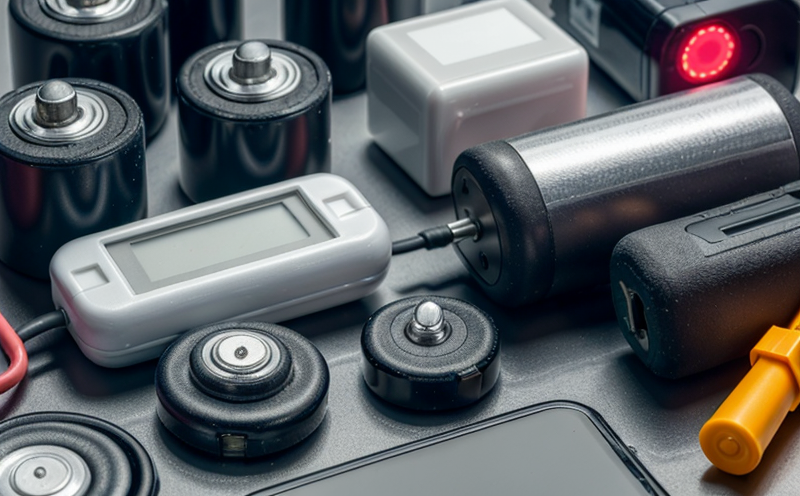Ensuring safety compliance for batteries used in medical devices and wearables
Ensuring Safety Compliance for Batteries Used in Medical Devices and Wearables A Critical Laboratory Service Provided by Eurolab
In todays fast-paced world of medical technology and wearable innovations, ensuring the safety compliance of batteries used in these devices is more crucial than ever. As businesses continue to push the boundaries of healthcare advancements and fashion wearables, they must prioritize the quality and reliability of their products. A single misstep can lead to severe consequences, including product recalls, financial losses, and most importantly, harm to patients or users.
At Eurolab, we understand that compliance is not just a regulatory requirement but a vital aspect of building trust with your customers and stakeholders. Our laboratory service specializes in ensuring safety compliance for batteries used in medical devices and wearables, providing businesses with the confidence they need to bring innovative products to market while minimizing risks.
The Importance of Ensuring Safety Compliance
In 2020, the number of wearable devices exceeded 1 billion units worldwide. With this growth comes an increased emphasis on battery safety, as these devices are more likely to cause harm if their batteries malfunction or catch fire. The consequences can be catastrophic, with reports of exploding e-cigarettes and hoverboards highlighting the need for vigilance.
The medical industry is equally demanding, with regulatory bodies such as the FDA (U.S.) and CE marking (EU) enforcing strict guidelines on battery safety. Non-compliance can result in severe penalties, product recalls, and damage to your companys reputation. In 2019, a prominent medical device manufacturer faced a 10 million fine for violating FDA regulations.
The Benefits of Using Eurolabs Laboratory Service
By partnering with Eurolab, businesses can ensure their batteries meet the highest standards of safety compliance while reaping numerous benefits
Advantages of Ensuring Safety Compliance
Reduced Risk Our laboratory service minimizes the risk of product recalls, financial losses, and reputational damage.
Compliance Assurance We guarantee that your products meet regulatory requirements, including those set by the FDA (U.S.) and CE marking (EU).
Cost Savings Avoid costly redesigns or re-testing due to non-compliance issues.
Enhanced Customer Trust Demonstrated commitment to safety compliance fosters trust among customers and stakeholders.
Competitive Edge Differentiate your business by showcasing a proactive approach to battery safety.
Regulatory Peace of Mind Our laboratory service ensures you stay up-to-date with changing regulatory requirements.
Key Benefits for Medical Devices
Patient Safety Ensure your medical devices meet the highest standards of safety compliance, protecting patients from harm.
Reduced Liability Minimize the risk of lawsuits and financial penalties associated with product malfunctions or recalls.
Improved Brand Reputation Demonstrate a commitment to patient safety, enhancing your companys reputation.
Key Benefits for Wearables
User Safety Prioritize user safety by ensuring your wearable devices meet strict battery safety standards.
Increased Sales Differentiate your business by showcasing a focus on user safety and well-being.
Competitive Advantage Stay ahead of the competition by adopting a proactive approach to battery safety.
Frequently Asked Questions (FAQs)
Q What types of batteries do you test?
A Our laboratory service specializes in testing various types of batteries used in medical devices and wearables, including lithium-ion, nickel-cadmium, and lead-acid batteries.
Q How long does the testing process take?
A The duration of our testing services varies depending on the complexity of the project. Typically, we can provide results within 2-6 weeks.
Q What regulatory bodies do you comply with?
A We adhere to guidelines set by prominent regulatory bodies such as the FDA (U.S.) and CE marking (EU).
Q How can I ensure my business stays compliant with changing regulations?
A Our laboratory service provides ongoing support, ensuring your products stay up-to-date with evolving regulatory requirements.
Conclusion
Ensuring safety compliance for batteries used in medical devices and wearables is no longer a nicety but an essential requirement. At Eurolab, we specialize in providing businesses with the confidence they need to bring innovative products to market while minimizing risks. By partnering with us, you can
Reduce risk and liability
Enhance customer trust and reputation
Stay ahead of the competition
Comply with regulatory requirements
Dont wait until its too late. Contact Eurolab today to learn more about our laboratory service and ensure your business meets the highest standards of safety compliance.
Trust the Experts
At Eurolab, we understand the importance of battery safety compliance in medical devices and wearables. Our team of experts will work closely with you to ensure your products meet regulatory requirements while providing ongoing support for evolving regulations. Partner with us today to take the first step towards a safer future.
-
Testing battery safety under international IEC 62133 safety standards
-
Verifying battery protection against electrical, mechanical, and environmental hazards
-
Simulating short circuit, overcharge, and thermal abuse conditions for compliance
-
Assessing battery performance under various stress tests for IEC 62133
-
Measuring the risk of fire, explosion, or chemical leakage during compliance testing
-
Testing for compliance with IEC 62133 for consumer electronics batteries
-
Evaluating the robustness of battery cells and packs against physical damage
-
IEC 62133 compliance testing for batteries used in electric vehicles
-
Determining battery safety during overcharge, deep discharge, and short-circuit scenarios
-
Assessing battery design features to meet IEC 62133 safety requirements
-
Simulating abusive conditions to ensure compliance with IEC 62133
-
Testing for safe operation and disposal of batteries according to IEC standards
-
IEC 62133 compliance testing for batteries in energy storage and industrial applications
-
Evaluating safety features in battery management systems for IEC compliance
-
IEC 62133 testing for batteries used in aviation and aerospace
-
Assessing the thermal stability of batteries under compliance testing conditions
-
Verifying battery casing and packaging against impact and puncture risks
-
Measuring voltage, current, and temperature limits during compliance testing
-
Testing for compliance with international battery safety standards for transport




